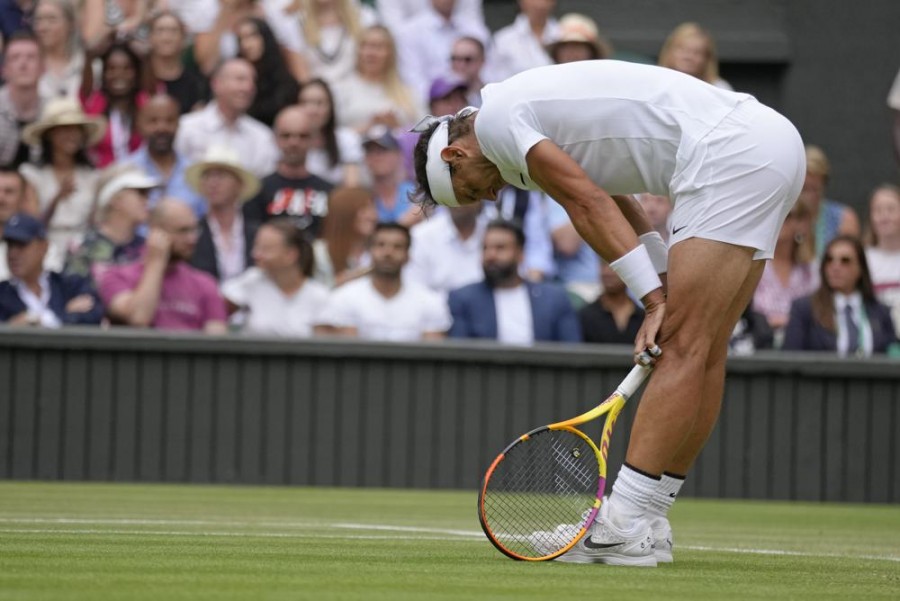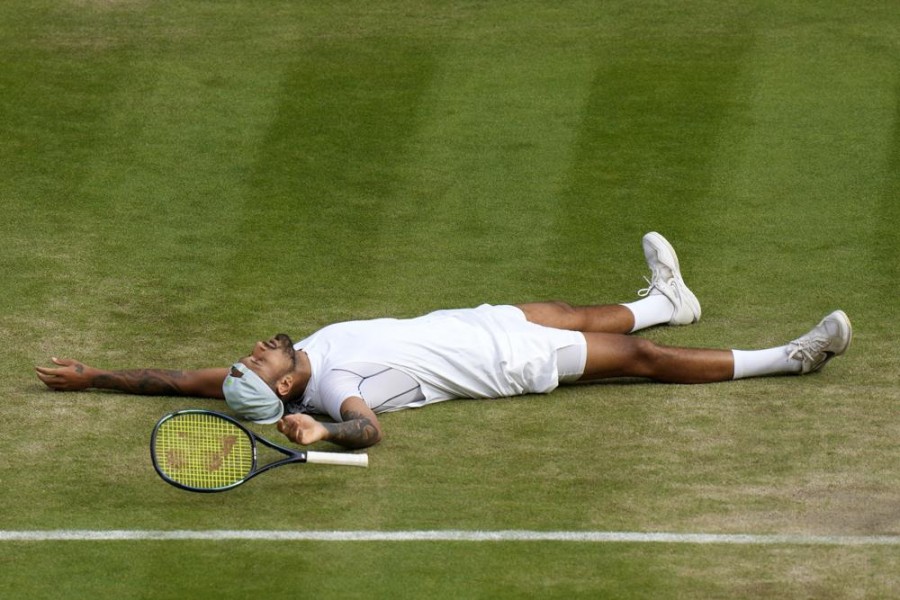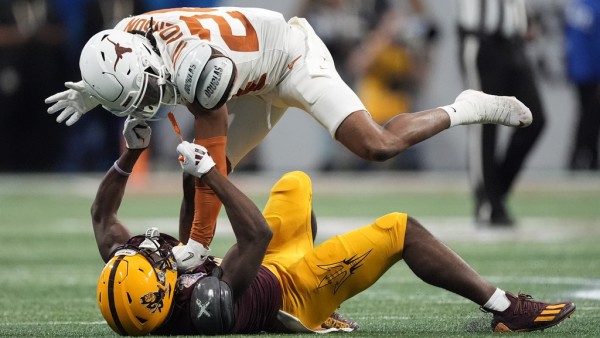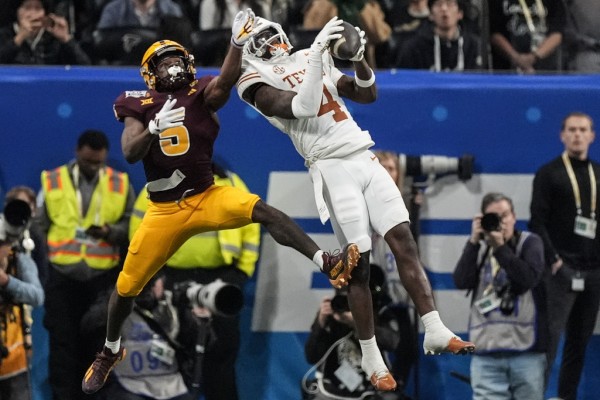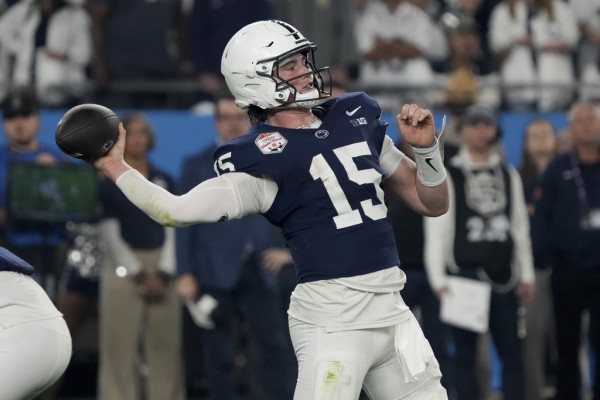WIMBLEDON, England — Wincing from abdominal pain, unable to ply his customary relentless style of tennis, Rafael Nadal though he might need to stop playing in the Wimbledon quarterfinals against Taylor Fritz.
Up in the Centre Court stands, Nadal’s father was waving his arms, motioning to the 22-time Grand Slam champion to quit. Not surprisingly, perhaps, he didn’t listen. Nadal stayed out there, adjusted his service motion and his strategy — and figured out a way to win.
With much of the crowd roaring and standing after Nadal’s best strokes, he twice erased one-set deficits against the 11th-seeded Fritz and emerged with 3-6, 7-5, 3-6, 7-5, 7-6 (10-4) victory Wednesday to reach his eighth semifinal at the All England Club.
“For a lot of moments,” Nadal said, “I was thinking, ‘Maybe I will not be able to finish the match.’”
He did complete it, but said he couldn’t be sure whether he will be able to play Friday against Nick Kyrgios, a 27-year-old Australian who earned his Grand Slam semifinal debut with a 6-4, 6-3, 7-6 (5) victory over Cristian Garin of Chile.
“I don’t know exactly what I have. It’s clear something’s not right,” said Nadal, who will get tests Thursday for an issue that first cropped up nearly a week ago but got much worse at 3-1 in the first set against Fritz. “I’m obviously worried.”
The other men’s semifinal is Novak Djokovic against Cam Norrie. The women’s semifinals Thursday are 2019 champion Simona Halep against Elena Rybakina, and Ons Jabeur against Tatjana Maria. Halep eliminated Amanda Anisimova 6-2, 6-4, and Rybakina defeated Ajla Tomljanovic 4-6, 6-2, 6-3.
Nadal got to his 38th career major semifinal by denying what would have been a first such appearance for Fritz, who beat Nadal in the hard-court final at Indian Wells, California, in March. That ended a 20-match winning streak for Nadal, who was bothered that day by a painful rib injury.
This time, the problem was a muscle in his stomach area, which had some athletic tape. Nadal left the court with a trainer for a medical timeout while up 4-3 in the second set; Fritz paced around the baseline, waiting.
A doctor gave Nadal some pills; the trainer tried to relax the muscle.
“They can’t do much,” Nadal said. “Nothing can be fixed when you have a thing like this.”
When action resumed, Nadal clearly was compromised. It was hard not to think: Might he give up?
Nadal acknowledged that went through his mind. Fritz did, too.
“It definitely made me kind of think. I kind of stopped being as aggressive,” the 24-year-old American said. “I feel like I let it kind of get to me a little bit.”
He pretty much handed over the second set of what would become a 4-hour, 21-minute contest under a sky of slate clouds. After Fritz took the third set, his big serve got broken three times in the next.
Nadal occasionally would watch a ball off Fritz’s orange racket fly by. Nadal couldn’t move the way he usually does. His trademark grunts of “Uhhhh!” were rare. He didn’t generate the usual zip on his serves, which dipped from a high of 120 mph to barely above 100 mph. He sought to end exchanges with a quick-strike forehand or a drop shot — sometimes with success, often not.
Still, he summoned his best for last, grabbing a 5-0 lead in the closing tiebreaker — the first-to-10, win-by-two format starting at 6-all in a fifth set is new to Wimbledon this year — and then five of the last six points.
Fritz’s take on the tiebreaker? “I just got destroyed,” he said.
“Probably hurts more than any loss I’ve ever had,” Fritz said. “After the match was over, I was sitting there and I felt like crying.”
Nadal extended his unbeaten mark in 2022 Grand Slam matches to 19-0 as he seeks to add a trophy at Wimbledon to his triumphs at the Australian Open in January and French Open in June. For everything he’s accomplished, the 36-year-old Spaniard never has won the first three Slam titles of a season.
Nadal, who won Wimbledon in 2008 and 2010, leads Kyrgios 6-3 head-to-head; they are 1-all at Wimbledon. In 2014, Kyrgios, then just 19 and ranked 144th, announced himself to the world by winning; in 2019, Nadal took the rematch after Kyrgios was at a local pub into the wee hours the night before.
“I feel like that would be a mouth-watering kind of encounter for everyone around the world,” Kyrgios, never afraid of a little hyperbole, said about facing Nadal again. “That would probably be the most-watched match of all time.”
Give Kyrgios credit for honesty on this matter, at least: Even he did not think this day ever would arrive. Kyrgios became the first unseeded and lowest-ranked man to get to the final four at the All England Club since 2008 by playing what, for him, amounts to a restrained and efficient brand of tennis against Garin.
“I thought my ship had sailed,” Kyrgios said. “Obviously, I didn’t go about things great early in my career and may have wasted that little window.”
Kyrgios, who is ranked 40th, has garnered more attention for his behavior on and off the court than his skills with a racket in hand. His match against the unseeded Garin came a day after police in Canberra, Australia, said that Kyrgios is due in court next month to face an allegation of common assault stemming from something that happened in December.
“I have a lot of thoughts, a lot of things I want to say, kind of my side about it,” Kyrgios said at his post-match news conference. “Obviously I’ve been advised by my lawyers that I’m unable to say anything at this time.”
Worth noting, too, is how well Kyrgios has been playing. His serve, in particular, is among the best in the game, regularly topping 130 mph, and he pounded 17 aces against Garin while getting broken just once — in the very first game, at love.
His big forehands are terrific, too, but little else is conventional about Kyrgios. One example: “I don’t have a coach,” Kyrgios said with a smile. “I would never put that burden on someone.”


